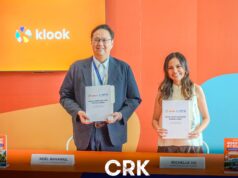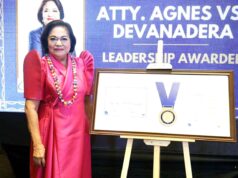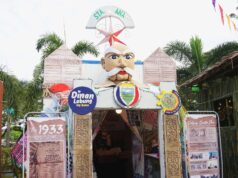CITY OF SAN FERNANDO – Almost every night since 2001, Lori Forman saw her Filipino maid Paula Fausto and her son Joey chat for 20 minutes on the Internet.
With a webcam in between them, the mother and son bridge the distance between Singapore and Japan.
“They say endless I love yous to each other,” Forman recalled of those happy moments in her home.
Seeing with her own eyes how the Internet keeps the Fausto family together even as they work from different parts of the globe, she did not need much convincing when then foreign affairs secretary Blas Ople broached an idea in 2003.
Forman, as director of Microsoft’s community affairs program in the Asia Pacific, Great China and Japan, spoke “more passionately” when she presented the board the suggestion of Ople to set up an information technology training program for overseas Filipino workers.
Ople died in Dec. 14, 2003 while in route to a diplomatic mission in Bahrain, never getting to see the idea he birthed and which Paula “inspired” in Forman.
Pioneered in the Philippines in 2004, the project Tulay (Bridge) has run community technology learning centers in Singapore in Kuala Lumpur in 2004, Hong Kong and Taiwan in 2005, Saudi Arabia in 2006 and Italy in 2007 for OFWs in those countries.
Starting 2005, Tulay centers also opened in San Fernando City in La Union, Tuguegarao, Legazpi, Cebu, Tacloban, Zamboanga, Cagayan de Oro, Davao and Koronadal.
The San Fernando center in Pampanga was opened in October last year, with Forman taking along Paula to see her home province.
“Paula is an inspiration, I saw the difference it made to her and Joey. I was convinced through her,” she said in an interview after the inauguration of the center.
Equipped with 10 computers with broadband Internet connection, the center is based at the Central Luzon office of the Overseas Workers Welfare Administration here.
All of the Tulay centers, whether abroad or in the Philippines and those replicated in Sri Lanka, China and other Asian countries, are funded by Microsoft’s global philanthropic community technology skills program called “Unlimited Potential.”
In the Philippines, it is implemented by OWWA and non-government organizations. The Blas F. Ople Policy Center and Training Institute is the NGO partner in the expansion of Tulay in 10 more Philippine cities as well as in Hong Kong and Taipei.
The BFOPCTI got a grant of $633,000-worth of licensed software and cash to do that, said BFOPCTI president Susan Ople.
Forman said that by June 2008, Microsoft has contributed $8 million in cash and software including $2.5 million to NGO partners helping victims of human trafficking or those vulnerable to it.
TULAY
Overseas or locally, the centers allow free use of facilities for OFWs to communicate with their loved ones back home via the Internet. These also give free basic and advanced computer classes in word processing, making spreadsheets, database presentation, web design, digital media and using the Internet and world wide web. Tesda in 2005 approved the Microsoft curriculum as an official training tool in those centers.
Overseas workers come to the centers on their day-offs. Those who have returned or their relatives go to the centers for training from Monday to Friday. The Friday afternoons are set aside as time for OFWs and their families to chat on the Internet.
Norma del Rosario, Tulay coordinator of the OWWA, said the project has trained 14,000 people since 2004.
The expansion phase seeks to reach out to 146,700 people and train 24,450 others in three years.
FAMILY, BUSINESS
Some OFWs have put Tulay to their advantage.
There is Eden of La Union. A graduate of biology with masteral units in education, she worked as a domestic helper in Hong Kong. Unable to withstand the shabby treatment of her employer, she returned a year after and started a business in handwoven baskets.
She enrolled in Tulay in 2006, using the Internet to promote her products, get orders and find out the sales from various outlets including SM.
Another is Jesus of Cebu City. This former draftsman in Saudi Arabia uses his computer skills learned in Tulay to conduct his real estate business. He constructed 100 power point slides to show photos of model houses and descriptions of those to clients. With Excel, he itemizes the cost of housing materials. Aged 60 now, he prefers to stay in the Philippines and do business online.
Nancy, on the other hand, does her parenting from Hong Kong through the Internet. On Sundays, her husband takes all their three children to an internet shop at an SM mall in Laguna where they all talk to her through a webcam. As a volunteer trainer at the Tulay center in Hong Kong, she earns HK670 every three months, including that in the savings that she plans to use for an internet shop back home by 2010.
Ramon of Taytay, Rizal felt it was never too late to learn computer skills. At 70, this former housekeeping supervisor in Kuwait trained at the Tulay center in Pasay. He communicates to his children and grandchildren in Canada via the Internet.
Paula said Tulay centers click because OFWs managed to save money. “They would have to spend more if they send text messages or made calls through their mobile phones,” she said.
“They also get to learn new skills. Some have started businesses back home,” she said, recalling accounts she learned when she comes along with Forman.
“She does not call me domestic helper. She calls me house manager, she treats me as a friend,” Paula said of her American boss to whom Microsoft entrusted a program that is now changing the lives of migrant workers and their families.
With a webcam in between them, the mother and son bridge the distance between Singapore and Japan.
“They say endless I love yous to each other,” Forman recalled of those happy moments in her home.
Seeing with her own eyes how the Internet keeps the Fausto family together even as they work from different parts of the globe, she did not need much convincing when then foreign affairs secretary Blas Ople broached an idea in 2003.
Forman, as director of Microsoft’s community affairs program in the Asia Pacific, Great China and Japan, spoke “more passionately” when she presented the board the suggestion of Ople to set up an information technology training program for overseas Filipino workers.
Ople died in Dec. 14, 2003 while in route to a diplomatic mission in Bahrain, never getting to see the idea he birthed and which Paula “inspired” in Forman.
Pioneered in the Philippines in 2004, the project Tulay (Bridge) has run community technology learning centers in Singapore in Kuala Lumpur in 2004, Hong Kong and Taiwan in 2005, Saudi Arabia in 2006 and Italy in 2007 for OFWs in those countries.
Starting 2005, Tulay centers also opened in San Fernando City in La Union, Tuguegarao, Legazpi, Cebu, Tacloban, Zamboanga, Cagayan de Oro, Davao and Koronadal.
The San Fernando center in Pampanga was opened in October last year, with Forman taking along Paula to see her home province.
“Paula is an inspiration, I saw the difference it made to her and Joey. I was convinced through her,” she said in an interview after the inauguration of the center.
Equipped with 10 computers with broadband Internet connection, the center is based at the Central Luzon office of the Overseas Workers Welfare Administration here.
All of the Tulay centers, whether abroad or in the Philippines and those replicated in Sri Lanka, China and other Asian countries, are funded by Microsoft’s global philanthropic community technology skills program called “Unlimited Potential.”
In the Philippines, it is implemented by OWWA and non-government organizations. The Blas F. Ople Policy Center and Training Institute is the NGO partner in the expansion of Tulay in 10 more Philippine cities as well as in Hong Kong and Taipei.
The BFOPCTI got a grant of $633,000-worth of licensed software and cash to do that, said BFOPCTI president Susan Ople.
Forman said that by June 2008, Microsoft has contributed $8 million in cash and software including $2.5 million to NGO partners helping victims of human trafficking or those vulnerable to it.
TULAY
Overseas or locally, the centers allow free use of facilities for OFWs to communicate with their loved ones back home via the Internet. These also give free basic and advanced computer classes in word processing, making spreadsheets, database presentation, web design, digital media and using the Internet and world wide web. Tesda in 2005 approved the Microsoft curriculum as an official training tool in those centers.
Overseas workers come to the centers on their day-offs. Those who have returned or their relatives go to the centers for training from Monday to Friday. The Friday afternoons are set aside as time for OFWs and their families to chat on the Internet.
Norma del Rosario, Tulay coordinator of the OWWA, said the project has trained 14,000 people since 2004.
The expansion phase seeks to reach out to 146,700 people and train 24,450 others in three years.
FAMILY, BUSINESS
Some OFWs have put Tulay to their advantage.
There is Eden of La Union. A graduate of biology with masteral units in education, she worked as a domestic helper in Hong Kong. Unable to withstand the shabby treatment of her employer, she returned a year after and started a business in handwoven baskets.
She enrolled in Tulay in 2006, using the Internet to promote her products, get orders and find out the sales from various outlets including SM.
Another is Jesus of Cebu City. This former draftsman in Saudi Arabia uses his computer skills learned in Tulay to conduct his real estate business. He constructed 100 power point slides to show photos of model houses and descriptions of those to clients. With Excel, he itemizes the cost of housing materials. Aged 60 now, he prefers to stay in the Philippines and do business online.
Nancy, on the other hand, does her parenting from Hong Kong through the Internet. On Sundays, her husband takes all their three children to an internet shop at an SM mall in Laguna where they all talk to her through a webcam. As a volunteer trainer at the Tulay center in Hong Kong, she earns HK670 every three months, including that in the savings that she plans to use for an internet shop back home by 2010.
Ramon of Taytay, Rizal felt it was never too late to learn computer skills. At 70, this former housekeeping supervisor in Kuwait trained at the Tulay center in Pasay. He communicates to his children and grandchildren in Canada via the Internet.
Paula said Tulay centers click because OFWs managed to save money. “They would have to spend more if they send text messages or made calls through their mobile phones,” she said.
“They also get to learn new skills. Some have started businesses back home,” she said, recalling accounts she learned when she comes along with Forman.
“She does not call me domestic helper. She calls me house manager, she treats me as a friend,” Paula said of her American boss to whom Microsoft entrusted a program that is now changing the lives of migrant workers and their families.




